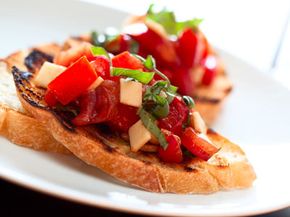Italy offers one of the most recognizable and diverse cuisines on the planet. Italians regularly feast on a variety of foods, but pizza and pasta are what they are most known for.
Pizza Pie
Advertisement
Pizza is currently one of the most popular foods in the world, despite the fact that it remained virtually unknown outside of Italy until the mid-20th century. There's evidence of Italians making pizza in some form or another as far back as the Stone Age, and it's mentioned in documents (though not all Italian) dating as far back as the sixth century B.C. [source: What's Cooking America]. Today, around 4 billion pizzas are sold every year in the United States, and many more are bought around the globe.
Pizza has become so popular because of its versatility. It's easy for each country or region to personalize their pies. In Japan, for example, it's not uncommon to find squid on a pizza; in Costa Rica, they prefer coconut.
Use Your Noodle
Pasta is another ancient food that's gained a global following. The ancient Romans dined on macaroni and considered it a gift from the gods. In modern times, pasta has turned into a worldwide phenomenon and, even though it's manufactured throughout the world, it's considered an Italian dish.
Pasta comes in all shapes and sizes, from shoestring spaghetti to the bowtie-shaped farfalle noodle. The variations are nearly endless, and, just like pizza, pasta is easily customizable. Italians top their dishes with a myriad of colorful sauces, vegetables and meats, making it as attractive as it is tasty. You can have anything from Sicilian pasta in squid ink sauce to veal and mushroom stew over mascarpone ravioli. Of course, you could also just chow down on some classic macaroni and cheese.
Each region of Italy has its own distinct dishes, flavors and traits, but pasta can generally be divided into two camps: Northern and Southern. In the North, rice and butter are extremely popular, while in the South, cornmeal, tomatoes and olive oil prevail -- butter is almost never used. Even the pasta varies between regions. Northern Italian chefs craft flat, ribbon shapes, while tubular designs prevail in the South [source: Ashkenazi].
Italian Wine and Sweets
Italian cuisine is more than just pizza and pasta, however. Italy has 20 wine-producing regions within its borders, all of which have received worldwide acclaim. Italians also love their sweets, and people come from across the globe to taste Milan's rich tiramisu and Puglia's sweet cinnamon rolls.
Authentic Italian Food at Home
You don't have to go to Italy or even an Italian restaurant to get a taste of the country. It's easy to add Italian flair to just about any meal. You can dip your bread in freshly ground pepper and olive oil (a common Italian appetizer) or sprinkle some Italian seasonings, such as rosemary, oregano and sage, onto your meal for a distinctive Italian kick.
Advertisement

